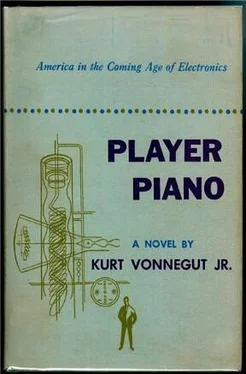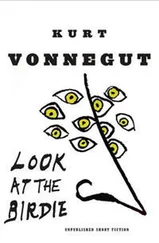The air quaked with a sharp, painful crash. And another. Another. "Blam!"
Rockets from the island were exploding overhead. In another minute the three yachts were rumbling and fuming into their slips, and the band was playing "The Star-Spangled Banner."
"And the rockets red glare,
The bombs bursting in air . . ."
The bandmaster held up his baton, and the bandsmen paused significantly. "Vuuuuzzzzzzip!" went a rocket. "Kablooooom!"
"Gave proof through the night,
That our flag was still there . . ."
After the anthem came a cheery kaleidoscope of "Pack Up Your Troubles," "I Want a Girl," "Take Me Out to the Ball Game," "Working on the Railroad."
The new arrivals scrambled over the decks to catch the hands extended from the wharf by a rank of older men, most of whom were fat, gray, and balding. These were the Grand Old Men -the district managers, the regional managers, the associate vice-presidents and assistant vice-presidents and vice-presidents of the Eastern and Middle-Western divisions.
"Welcome aboard!" was the greeting, and always had been. "Welcome aboard!"
Paul saw that Kroner was reserving his big hand and welcome for him, and he picked his way across the deck until he reached the hand, took it, and stepped to the wharf.
"Good to have you aboard, Paul."
"Thank you, sir. It's good to be aboard." A number of the other older men paused in their greetings to look in friendly fashion at the bright young son of their departed wartime leader.
"Report to the Ad Building for registration, then check into your tents to make sure your luggage is there," said the public address system. "Get to know your tentmate, then lunch."
With the band leading them, the new arrivals swung along the gravel walk to the Administration Building.
Across the building's entrance was a banner declaring: "The Blue Team Welcomes You to the Meadows."
There were cries of good-natured outrage, and human pyramids were built in a twinkling, with the top men clawing down the infuriating message.
A young member of the Blue Team slapped Paul on the back. "What an idea, Cap'n!" he crowed. "Boy, that really showed 'em who's got the wide-awake outfit. And we'll go on showing these guys, too."
"Yep," said Paul, "you bet. That's the spirit." Apparently this was the youngster's first visit to the Meadows. In this state of nature he didn't know that the banner was the work of a special committee whose sole mission was to stir up team rivalry. There would be more such goads at every turn.
Inside the door was a green placard: "Abandon All Hope, Ye Who Don't Wear Green Shirts!"
Shepherd whooped delightedly, brandished the placard overhead, and in the next second was thrown to the floor by a wave of Blues, Whites, and Reds.
"No rough-housing indoors!" said the loudspeaker sharply. "You know the rules. No roughhousing indoors. Save your ginger for the playing field. After registration, report to your tents, get to know your buddies, and be back for lunch in fifteen minutes."
Paul arrived at his tent ahead of his as yet unknown buddy. The two of them, according to the foreword in the Song Book , would develop a sort of common-law brotherhood as a result of their having shared so much beauty, excitement, and deep emotion together.
The chill of the air-conditioned room made him feel dizzy. Coming out of this flicker of vertigo, Paul's eyes focused on a dinner-plate-size badge on the pillow of his bunk. "Dr. Paul Proteus, Wks. Mgr., Ilium, N. Y.," it said. And, below this, "Call Me Paul or Pay Me $5." The second part of the legend was on every badge. The only man who was not to be called by his first name at the Meadows was the Old Man himself, the successor of Paul's father, Doctor Francis Eldgrin Gelhorne. He, National Industrial, Commercial, Communications, Foodstuffs, and Resource Director, was damn well Doctor Gelhorne, sir, at any hour of the night or day, and anywhere he went.
And then Paul saw the badge on his buddy's pillow: "Dr. Frederick Garth, Wks. Mgr., Buffalo, N. Y. Call Me Fred or Pay Me $5."
Paul sat down on the edge of his bed and struggled against the uneasy perplexity the sight of Garth's badge had precipitated. He had known many men, Shepherd for instance, who were forever seeing omens and worrying about them - omens in a superior's handshake, in the misspelling of a name in an official document, in the seating arrangement of a banquet table, in a superior's asking for or offering a cigarette, in the tone of . . . Paul's career, until recent weeks, had been graceful and easy all the way, and he'd found omen analysis dull, profitless. For him the omens were all good - or had been until now. Now, he, too, was growing aware of possibly malevolent spooks, revealing themselves in oblique ways.
Was it chance or ignorance or some subtle plot that had put him in the same cell with Garth, the other candidate for Pittsburgh? And why had Shepherd been made a captain, when the honor was reserved for those who were going high and far indeed? And why. . . . Manfully, Paul turned his thoughts into other channels, superficially, at least, and managed to laugh like a man who didn't give a damn about the system any more.
His buddy walked in, gray at the temples, tired, pale, and kind. Fred Garth wanted desperately to be liked by everyone, and had achieved a sort of social limbo, affecting no one very much one way or the other. He had risen because of this quality rather than in spite of it. Time and time again two powerful personalities, backed by impressive factions, had aspired for the same job. And the top brass, fearing a split if they chose one faction's man over the other, had named Garth as an inoffensive compromise candidate. There was a feeling, general enough not to be branded sour grapes, that Garth was all but over his head in the big assignments compromise politics had handed him. Now, though he was only in his early fifties, he seemed terribly old - willing, goodhearted, but apologetically weak, used up.
"Doctor Proteus! I mean Paul." Garth shook his head, laughed as though he'd done a comical thing, and offered a five-dollar bill to Paul.
"Forget it, Doctor Garth," said Paul, and handed it back to him. "I mean Fred. How are you?"
"Fine, fine. Can't complain. How's the wife and children?"
"All fine, fine, thanks."
Garth blushed. "Oh say, I'm sorry."
"About what?"
"I mean, that was silly of me, asking about your children when you haven't got any."
"Silly of me not to have any."
"Maybe, maybe. It's a trial, though, watching your kids grow up, wondering if they've got what it takes, seeing 'em just about killing themselves before the General Classification Tests, then waiting for the grades -" The sentence ended in a sigh. "I've just gone through that GCT business with my oldest, Brud, and I've got to live through the whole nightmare twice more still, with Alice and little Ewing."
"How'd Brud make out?"
"Hmmm? Oh - how'd he make out? His heart's in the right place. He wants to do well, and he boned up harder for the tests than any kid in the neighborhood. He does the best he can."
"Oh - I see."
"Well, he's going to get another crack at the tests - different ones, of course. He was under the weather when he took them the first time - tail end of some virus business. He didn't miss by much, and the Appeal Board made a special ruling. He gets his second chance tomorrow, and we'll have the grades around suppertime."
"He'll make it this time," said Paul.
Garth shook his head. "You'd think they'd give a kid something for trying, wouldn't you? God, you oughta see the little guy plugging away."
"Nice day," said Paul, changing the distressing subject.
Читать дальше








![Курт Воннегут - Вампитеры, фома и гранфаллоны [litres]](/books/397997/kurt-vonnegut-vampitery-foma-i-granfallony-litre-thumb.webp)